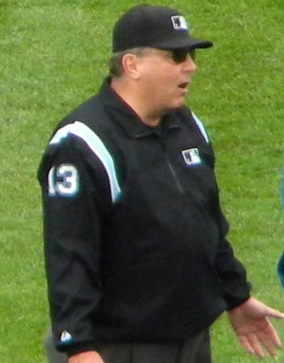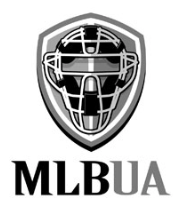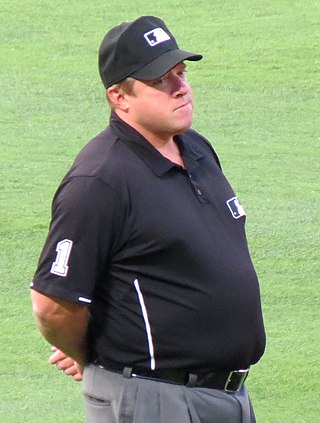Related Research Articles

In baseball, the umpire is the person charged with officiating the game, including beginning and ending the game, enforcing the rules of the game and the grounds, making judgment calls on plays, and handling the disciplinary actions. The term is often shortened to the colloquial form ump. They are also sometimes addressed as blue at lower levels due to the common color of the uniform worn by umpires. In professional baseball, the term blue is seldom used by players or managers, who instead call the umpire by name. Although games were often officiated by a sole umpire in the formative years of the sport, since the turn of the 20th century, officiating has been commonly divided among several umpires, who form the umpiring crew. The position is analogous to that of a referee in many other sports.
In professional sports, a replacement player is an athlete who is not a member of the league's players association and plays during a labor dispute such as a strike or lockout, serving as a strikebreaker.

Bill "Mad Dog" Madlock, Jr. is an American former professional baseball player and coach. He played in Major League Baseball as a third baseman from 1973 to 1987. Madlock is notable for being a four-time National League batting champion. His four batting titles as a third baseman was a record until Wade Boggs attained his fifth in 1988. Since 1970, only Tony Gwynn has won more National League batting titles (eight). Madlock is also one of only three right-handed hitters to have won multiple National League batting titles since 1960, Roberto Clemente having also won four and Tommy Davis having won back-to-back titles in 1962 and 1963.

Joseph Henry West, nicknamed "Cowboy Joe" or "Country Joe", is an American former baseball umpire. He worked in Major League Baseball (MLB) from 1976 to 2021, umpiring an MLB-record 43 seasons and 5,460 games.

Derryl Cousins was an American umpire in Major League Baseball (MLB), who worked in the American League (AL) from 1979 to 1999, and umpired throughout both leagues from 2000 until his retirement following the 2012 season, ending his career as a crew chief.

John Francis Hirschbeck is a former umpire for Major League Baseball. He worked in the American League from 1984 to 1999 and worked in both leagues from 2000 to 2016. He was a crew chief at the time of his retirement, and wore uniform number 17 throughout his career. Hirschbeck announced his retirement following the 2016 season. In 2000, Hirschbeck was elected as the first president of the newly certified World Umpires Association, a position he held until 2009.

The Major League Baseball Umpires Association (MLBUA) is an organization of Major League Baseball (MLB) umpires. It was certified by the National Labor Relations Board on February 24, 2000, as the World Umpires Association (WUA) as a bargaining agent. It took over as the bargaining agent for MLB umpires after the 2000 MLB season, replacing the Major League Umpires Association (MLUA), which dated back to 1970, and has since been responsible for defending their personnel since. On July 17, 2018, it rebranded itself as the Major League Baseball Umpires Association.

Robert Allan Davidson is a former umpire in Major League Baseball (MLB). Nicknamed "Balkin' Bob" and "Balk-a-Day Bob" for his tendency to liberally invoke baseball's balk rule, Davidson was an umpire on the National League (NL) staff from 1982 to 1999, and he was on the combined MLB umpiring staff from 2005 to 2016. He worked one World Series (1992) and several other postseason series.

Richard Gregory Phillips Sr. was an American lawyer. From 1978 to 2000, he was general counsel and executive director of the Major League Umpires Association (MLUA). He held a similar position for National Basketball Association (NBA) referees. Phillips is notable for recommending that Major League Baseball (MLB) umpires resign en masse in 1999.

Gerald Joseph Crawford is an American former umpire in Major League Baseball. He first umpired in the National League from 1977 to 1999, then worked in both major leagues from 2000 to 2010.

James Alfred Joyce III is an American former professional baseball umpire who worked in the American League (AL) from 1987 to 1999 and throughout Major League Baseball (MLB) from 2000 to 2016. He wore uniform number 6 while in the AL and number 66 for MLB. His loud and enthusiastic strike calls drew comparisons to that of retired umpire Bruce Froemming. Though his umpiring was generally praised by players and coaches, Joyce is best known for his incorrect call in Armando Galarraga's near-perfect game in June 2010.
The most recent umpire strike in Minor League Baseball history was the strike of 2006. It involved primarily a monetary dispute between the Association of Minor League Umpires (AMLU), a trade union, and the Professional Baseball Umpire Corporation (PBUC), a management company. The dispute resulted in the hiring of replacement umpires for a number of games, followed by minor concessions by both parties, resulting in a slight wage increase for umpires employed in Minor League Baseball.

Frank Victor Pulli was a professional baseball umpire, working in the National League from 1972 until 1999. He umpired many postseason games, including four World Series. Pulli wore uniform number 14 during his career.

Thomas Francis Hallion is a retired Major League Baseball umpire who worked in the National League (NL) from 1985 to 1999 and in both major leagues from 2005 until 2022. He was promoted to crew chief in 2010. Hallion has worn number 20 during his MLB career. He resigned from the NL in 1999 as part of a failed mass bargaining strategy, but he was rehired by MLB before the 2005 season.
The 1999 Major League Umpires Association mass resignation was a labor tactic used by 68 Major League Baseball (MLB) umpires, including 66 members of the Major League Umpires Association (MLUA), the official umpires union at the time. Unable to strike because they had a labor agreement in place at the time, 57 umpires formally resigned by orchestrated letters in an attempt to force negotiations with MLB for a new labor agreement. The American and National Leagues instead immediately hired new umpires and accepted 22 of the resignations. The union membership became fractured on the issue, and the umpires tried to rescind their resignations, but the MLUA was unsuccessful in retaining the jobs of the 22 umpires and the resignations were seen as final. The incident led to the decertification of the MLUA and the formation of a new union, the World Umpires Association (WUA), now the Major League Baseball Umpires Association.

Daniel James Reyburn is an American Major League Baseball umpire. He wore uniform number 70 when he first came up to MLB, then changed to number 17 starting with the 2018 season, two years after the retirement of John Hirschbeck, who previously wore #17.
Mark Hirschbeck is a former umpire in Major League Baseball who worked in the National League from 1987 to 1999, and both Major Leagues from 2000 until his retirement in 2003.

Bruce Michael Dreckman is an American umpire in Major League Baseball. He wears number 1.
The 1979 Major League Umpires Association Strike was a labor action by the Major League Umpires Association (MLUA) against Major League Baseball (MLB) that lasted from March until mid-May, 1979.

Manuel Augusto González is a Venezuelan umpire in Major League Baseball (MLB). He made his major-league umpiring debut on May 17, 2010, filling in for John Hirschbeck, becoming the first Venezuelan umpire in MLB history.
References
- ↑ "Major League Baseball Umpires to File Unfair Labor Practices Charges Tomorrow Against National and American Leagues". Business Wire. August 3, 1999. Retrieved January 3, 2010.
- 1 2 3 "Stoic Men in Blue: Major League Umpires" (PDF). 247baseball.com. Retrieved January 3, 2010.
- ↑ "Umpiring Timeline". MLB.com. Retrieved January 3, 2010.
- 1 2 "Baseball's Interim Umps Batting .000?". Lakeland Ledger. April 22, 1979. Retrieved January 3, 2010.
- 1 2 3 "On To Commissioner". Sarasota Herald-Tribune. June 3, 1980. Retrieved January 3, 2010.
- 1 2 "UMPIRES' VOTE OUSTS PHILLIPS". Seattle Post-Intelligencer. December 1, 1999. Archived from the original on November 2, 2012. Retrieved January 3, 2010.
- ↑ Koerber, C. P.; Neck, C. P. (2003). "Groupthink and sports: an application of Whyte's model". International Journal of Contemporary Hospitality Management. 15: 20–28. doi:10.1108/09596110310458954.